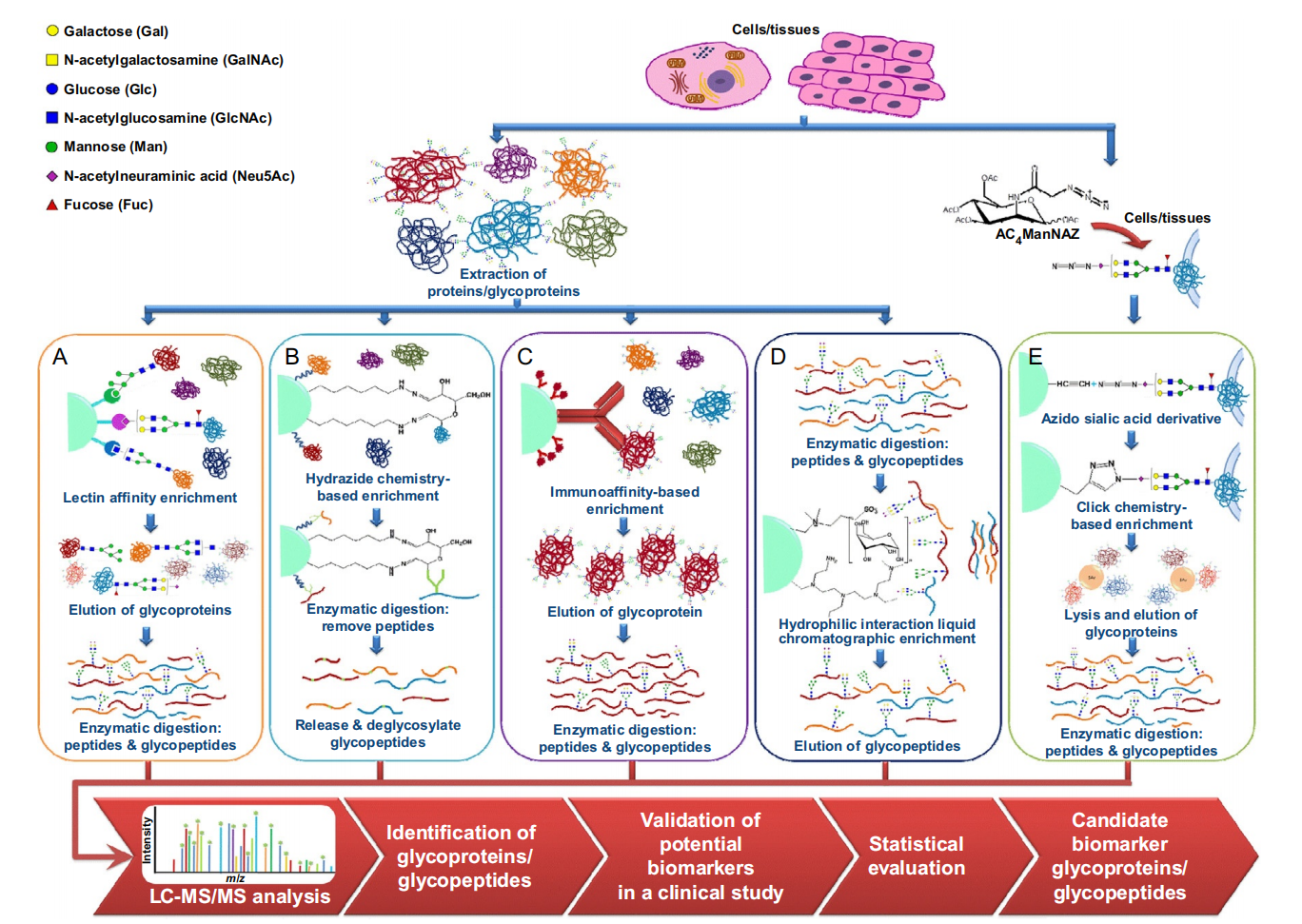Glycoprotein Peptide Enrichment Service
Glycoprotein peptide enrichment refers to the selective isolation and concentration of glycopeptides from complex protein mixtures after enzymatic digestion. Since glycopeptides contain both peptide backbones and attached glycans, they carry critical information about site-specific glycosylation and structural diversity. However, they often occur in very low abundance and are masked by a much larger pool of non-glycosylated peptides, which makes direct detection and characterization challenging.
The enrichment of glycoprotein peptides is therefore an essential step in glycoproteomic workflows. By specifically capturing glycopeptides, researchers can increase the sensitivity and accuracy of downstream mass spectrometry analysis, enabling precise mapping of glycosylation sites, characterization of glycan structures, and quantification of glycopeptide heterogeneity. This process is crucial not only for advancing our understanding of protein biology but also for supporting biopharmaceutical development, where glycosylation is recognized as a critical quality attribute. Enrichment strategies make it possible to detect subtle glycosylation changes linked to disease states, drug efficacy, or manufacturing consistency.
Service at MtoZ Biolabs
To address these analytical challenges, MtoZ Biolabs offers a dedicated Glycoprotein Peptide Enrichment Service that integrates multiple enrichment techniques with advanced mass spectrometry platforms. Our service enables researchers and developers to obtain high-quality glycoprotein data with improved sensitivity, specificity, and biological relevance.
Our enrichment strategies include:
🔸Lectin Affinity Enrichment: Employs lectins with defined sugar-binding specificities to isolate glycopeptides carrying motifs such as mannose, fucose, or sialic acid.
🔸Hydrazide Chemistry-Based Enrichment: Captures glycopeptides by covalently binding oxidized glycans to hydrazide groups, enabling selective enrichment.
🔸Immunoaffinity-Based Enrichment: Uses antibodies specific to glycan epitopes or glycoproteins to achieve highly selective glycopeptide capture.
🔸Hydrophilic Interaction Liquid Chromatography (HILIC): Exploits the hydrophilic properties of glycopeptides to separate them from non-glycosylated peptides.
🔸Boronate Affinity Chromatography: Utilizes boronic acid-functionalized matrices that reversibly bind cis-diol groups of glycans, enriching glycopeptides efficiently.
🔸Titanium Dioxide (TiO2) Enrichment: Offers effective isolation of sialylated glycopeptides due to the strong affinity between TiO2 and acidic glycans.
🔸Porous Graphitic Carbon (PGC) Chromatography: Provides strong retention and resolution of glycopeptides, allowing analysis of isomeric glycan structures.
Analysis Workflow

Figure 1. Typical Glycoprotein Peptide Enrichment Workflow
Service Advantages
✅Specialized Expertise: Experienced scientists with expertise in glycoproteomics.
✅Advanced Technology: Cutting-edge mass spectrometry and chromatography platforms for high-resolution analysis.
✅Comprehensive Approaches: Multiple enrichment strategies to maximize glycopeptide coverage.
✅Customizable Solutions: Flexible workflows tailored to specific project requirements.
✅One-Time-Charge: Our pricing is transparent, no hidden fees or additional costs.
Applications
1. Disease Mechanism Research
Enriched glycopeptides enable detailed mapping of glycosylation changes that drive cancer, autoimmune disorders, infectious diseases, and other pathologies.
2. Clinical Diagnosis
Glycopeptide profiles can serve as diagnostic markers, supporting early disease detection and personalized medicine strategies.
3. Biopharmaceutical Analysis
Enrichment workflows provide critical data on therapeutic glycoproteins, ensuring consistency, stability, and regulatory compliance in drug development.
4. Biomarker Discovery
Glycosylation alterations revealed through peptide enrichment can identify novel biomarkers for prognosis, therapeutic monitoring, and stratified medicine.
5. Structural Biology
Site-specific enrichment of glycopeptides facilitates structural analysis, linking glycan modifications with protein folding, stability, and interactions.
6. Systems Biology
Large-scale glycopeptide enrichment combined with proteomics offers insights into regulatory networks, signaling pathways, and glycosylation-driven cellular dynamics.
Sample Submission Suggestions

All samples should be kept on ice during processing, and stored at –80°C prior to shipment. Ship samples on dry ice with proper labeling and accompanying documentation.
If you have special sample types or require additional guidance, please contact us for personalized support before sample preparation.
Deliverables
1. Experimental design and workflow description.
2. Details of enrichment strategies and analytical methods.
3. LC-MS/MS spectra and glycopeptide identification results.
4. Site-specific glycosylation profiles and quantitative data.
5. Bioinformatics analysis and interpretation report.
6. Raw and processed data files.
Related Services
Peptide Enrichment Service | MS-compatible
Glycoprotein Profiling Service
Glycoprotein Quantification Service
Glycoprotein Structure Analysis Service
How to order?







